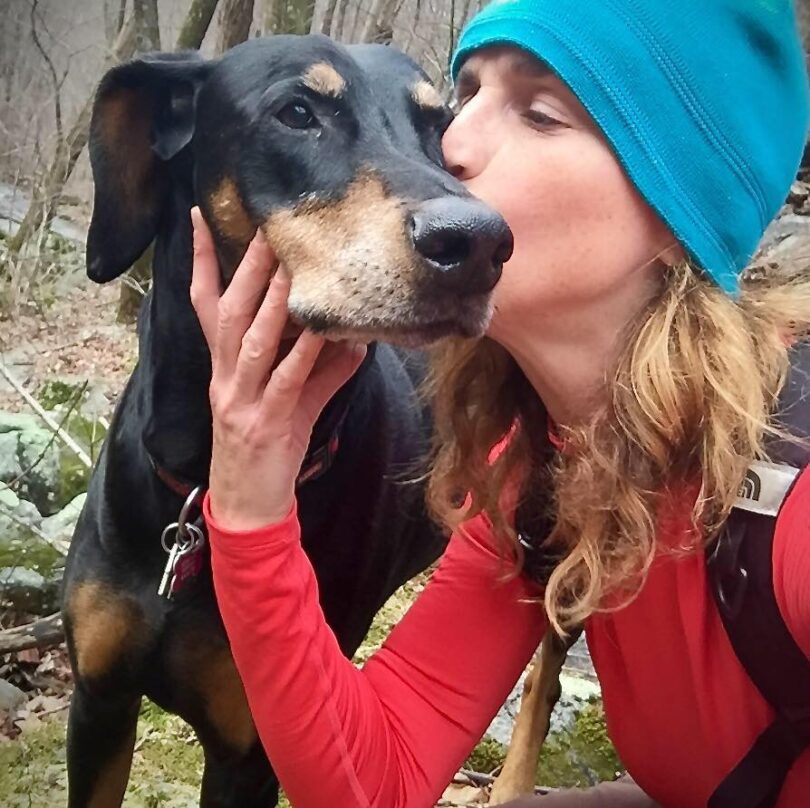Ernest Hemingway says, “Write hard and clear about what hurts.”
This is my story.
It doesn’t matter what the source of the grief is. What matters is whether or not you have experienced the loss of someone or something so deeply you weren’t sure if you would draw the next breath.
That is where my grief started. Not a moment before his last drawn breath. As if the expiration of the air in his lungs carried into the wind my own breath. A palpable moment in which we separated ways on this earth as his body went limp in my arms.
It was anticipated this day would come. I received the diagnosis and the estimated length of life. I wholeheartedly tackled the next chapter of our time together with a calculated list of ways to savor every moment. I made preparations, called people, created a wish list of how the moment of passing would be peaceful and beautiful.
It was peaceful and beautiful. He was such a gentleman about the whole ordeal. He knew it was time, and he chose to watch a sunrise with me and leave on his terms.
I have been surrounded by many opportunities to experience death. I’ve worked in hospice, nursing homes, a hospital. I have experienced the passing of family members. So when the day came to actually watch his life fade from his failing body, I was not prepared for the gut punch of grief that followed.
Grief is defined as intense sorrow. The intensity of my sorrow would be difficult to describe. It is as if all the molecules in my bone marrow were all tearfully shrieking. It hurt. Everyone has their own way they process their grief. Emotional reactions of grief can include anger, guilt, anxiety, sadness, and despair, not in any order. Sometimes I question if the sadness will ever go away. It’s as if a cold dewy fog lingers in my brain and won’t allow the sun to come in.
I googled the phrase, “Can you die from grief”. I really did. I was a little worried I was going to physically break from crying so hard. It turns out, you really can die from a broken heart. I wasn’t sure what my healing process looked like or how long it would take, but I knew I couldn’t evaporate away with my salty tears.
What I learned since that day is grief has its own timeline. There is no rushing to a finish line. There is no checkbox list to work through. You wake up one day and can’t seem to manage your emotions. The next day, you are able to have conversations about your loved one, the experience of his death. Then another day, you are overwrought with guilt.
I would like to say that after the intense sorrow, I was able to move on. Instead, I spent hours evaluating the years I had with him. Did I give him the best life possible? Could I have paid more attention to his comfort, his joy, his desire to be by my side every possible moment? I apologized to him for all the times I made him sad. I apologized for all the bad decisions he saw me through, the time I wasted on people who did not see my value as he did. I was, after all, the center of his universe. Did I respect that?
I have mostly good days, I enjoy sharing stories, reminiscing of the adventures we had. Today, I thought it would be a good idea to take some non-sentimental but functional items to donate to the less fortunate. It felt good as I collected the medications, the dishes, the toys, and carefully bagged them in an organizational fashion. I called ahead and was told I could ring the bell when I arrived.
When I rang the bell, I was told, “Thank you! Just leave them at the door and someone will come out to collect them!” Ah, the joy of Covid days, in which we no longer have personal exchanges with strangers. I am supposed to leave my dearly beloved’s items in bags on a sidewalk for an unknown amount of time. I started to feel a little anxiety. I was eyeing the bags and second guessing my decision. Like a little kid with his toys, I wanted to grab all of his things up and throw them in the car. “Maybe I shouldn’t give them away yet, what if…” But, no. He is gone. These items can be used by someone else. I kept his most precious things. It’s OK. No, It’s not OK…
Finally, A lady who looked as if she may be an employee approached the entrance. I asked, “Do you work here?”
She happily replied that she did, in fact, work there, and what could she do to assist me?
I said, “I brought these things. My dog died. I can’t just leave them here on the sidewalk. I need someone to carry them in.”
As the words spilled out, so did my tears. A tsunami of inconsolable crying took over. I thought I had wrung it all out many times over.
She instantly recognized the situation and thanked me for making a donation. I walked to the car and sobbed as I watched her transition my bags through the locked door. Those were his things that I carried with me, some of them through as many as four moves, as long as 11 years. They are important but no longer necessary.
Making a donation did not go as planned. I was looking for some healing salve to wash over me as I watched his things go into this center and be prepared to disperse to the vulnerable. I was truly looking for a way to tell his legacy, to share his joy for life, to have someone look at me and say, “you were truly blessed. I can sense that he was different.”
But that’s not what happened. Instead, I watched as four more people came and went leaving donations on the doorstep. I watched as people rang the bell looking for an appointment, employees rushed to another day of duties. I saw the world continue business as usual as if there is no consequence to his absence in it. My loss felt violated by everyone’s lack of awareness to the vacuum in my heart.
Then I drove off to the otherwise meaningless errands left on my list.
It’s the little routines that get me. It’s reaching down to scratch his ear when I sit down with a cup of tea or a glass of wine on the back porch. It’s hearing his “tap tap tap” as he comes to the kitchen at the first scent of bacon cooking for breakfast. It’s stepping around his bed, it’s stepping to the side as I go up a flight of stairs so he can pace beside me, on the left. It’s hearing him run to the door when I put my key in the lock upon return. It’s taking a walk, how do I do that without him? It’s planning a hiking trip with the sole purpose of choosing a trail he will be able to enjoy. My entire life has been centered around his presence. His forever house. His Subaru. His chaise lounger by the fire. His choice of piano music, which happens to be Chopin.
One day, I said to my husband, “I want to take this time and evaluate all of the things I’ve considered doing, but chose not to because I could not include him.” It seems like a good idea. But I don’t like the feeling of drawing a line in the sand of my life. Life with Sammy. Life without Sammy. I don’t want to lose the intricate details of life when he was around. I fear his memory will fade if I begin to plan days that don’t include him.
It’s a terrible paradigm to be in. Letting go. Holding on. Respecting his memory. Permission to mourn. Moving on. Making plans. Canceling plans. Functioning in a new normal. Remembering the emptiness with reverence. Ignoring the emptiness purposefully. Recovery. Resilience.
I feel I owe it to Sammy to get on my feet and find my joy again. He did stand by my side for 11 years. He walked me through difficult times and participated in my life choices. He would not approve of all of the moping and lackluster existence… I swear I am trying to do his memory good, but the exhaustion is overwhelming. I seem to spin my idle moments looking over pictures and thinking of all the moments in the last year of his life. When did the tumor show up in the cavity of this pure being? Was it in this photograph? Was it during the house renovations? Was it because I caused him hardship? Was I a difficult human project for him? What if this tumor is all of the evil and dark things that used to be in my body and he absorbed them? These are the things I ponder.
When Sammy passed away, I could still feel his presence in my home. I swear I could sense him watching over me. I could imagine him lounging on the porch next to me on my first Friday night. Now I don’t feel him anymore. Maybe he is gone because he knows I’m OK. Maybe he had an important mission he was called to; another little girl is in need of his protection, love, and honor. Or maybe I was a challenging job he was assigned to on this earth and he earned some afterlife spa days. Who knows where he is, but it’s another day to process my new normal, make amends with the idea that with life comes death, and the greater the love, the greater the loss.
Everyone’s mourning process looks different. I hope that whoever you are out there reading these words and hurting for your loss, you give yourself grace. Cry. Scream. Hold on to the sentimental items until you are ready to let go. But don’t judge. I once read “grief is like swimming in the ocean. It ebbs and flows. Sometimes it overwhelms you. Sometimes it’s a peaceful floating presence. But all you can do is learn to swim in it.”
Time alone does not heal. It is the loyalty to life that heals.” ~ Stephanie Ericcson







